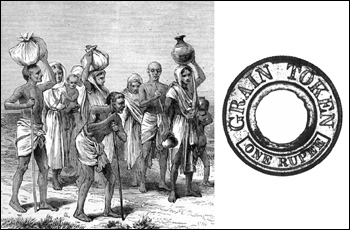|
"Making Cents"
The Signal
Saturday, August 5, 2006
| I |
In the history of emergencies, governments in the past resorted to the use of emergency tokens to assist victims.
One classic case was the issuance by Great Britain of one-rupee "Grain Tokens" in 1874 for famine victims in India to buy food — as the tokens could be used only for purchasing food. Because nearly all were eventually redeemed, the few remainders are very rare and valuable to collectors today.
During World War II, the Office of Price Administration — which controlled rationing, food distribution and price controls — issued small red and blue OPA tokens. They were not redeemable for food, but when purchasing certain foods such as meat, a certain number of tokens could accompany the purchase. The tokens (and ration coupons) were issued on the basis of family size and need, as determined by the OPA.
Many people who lived through World War II probably still have unused food stamps and tokens. Since so many tokens were issued, they are not especially scarce today.
During World War II, the Treasury Department issued special military currency known as MPCs, or Military Payment Certificates. They were designed to prevent foreign nationals from capturing U.S. troops with regular-issue currency. MPCs were redeemable at military and naval stations and were not exchangeable for any other currency. Additional measures were taken to prevent the possibility of regular U.S. currency falling into enemy hands.
In the 1800s, as the population was moving westward into new and underexplored territories, many areas were short of hard money. For the Army, special camp followers with wagons of supplies and sundries would offer their wares in exchange for "sutler tokens" (not settler). Genuine coins, U.S. or foreign, were hard to come by, so these Army tokens were readily accepted as emergency money.
Had FEMA issued food stamps or similar specific warrants, the credit-card misuse might have been averted. However, no contingency plan probably existed for the issuance of tokens, food stamps or market coupons.
Dr. Sol Taylor of Sherman Oaks is president of the Society of Lincoln Cent Collectors and author of The Standard Guide to the Lincoln Cent. Click here for ordering information.
©2006, THE SIGNAL · ALL RIGHTS RESERVED.

![[Most Recent Quotes from www.kitco.com]](http://www.kitconet.com/images/quotes_special.gif)

